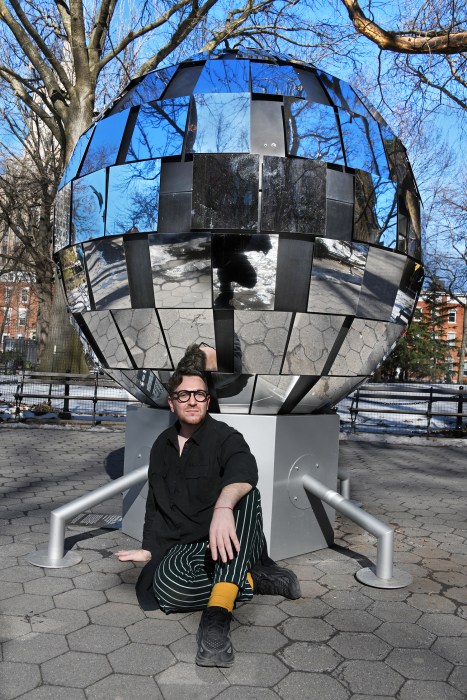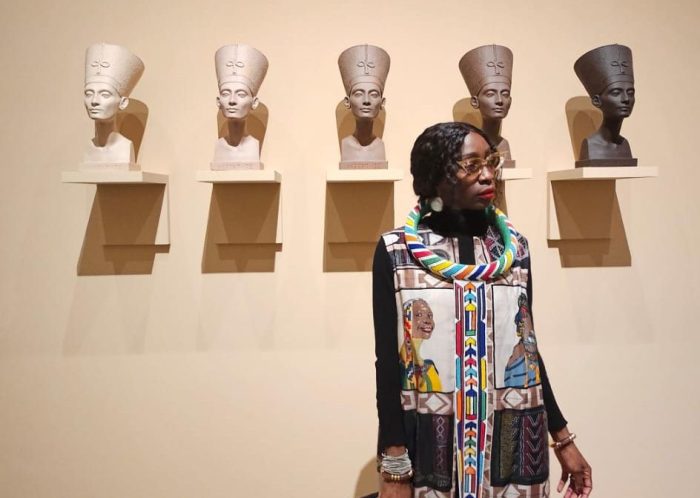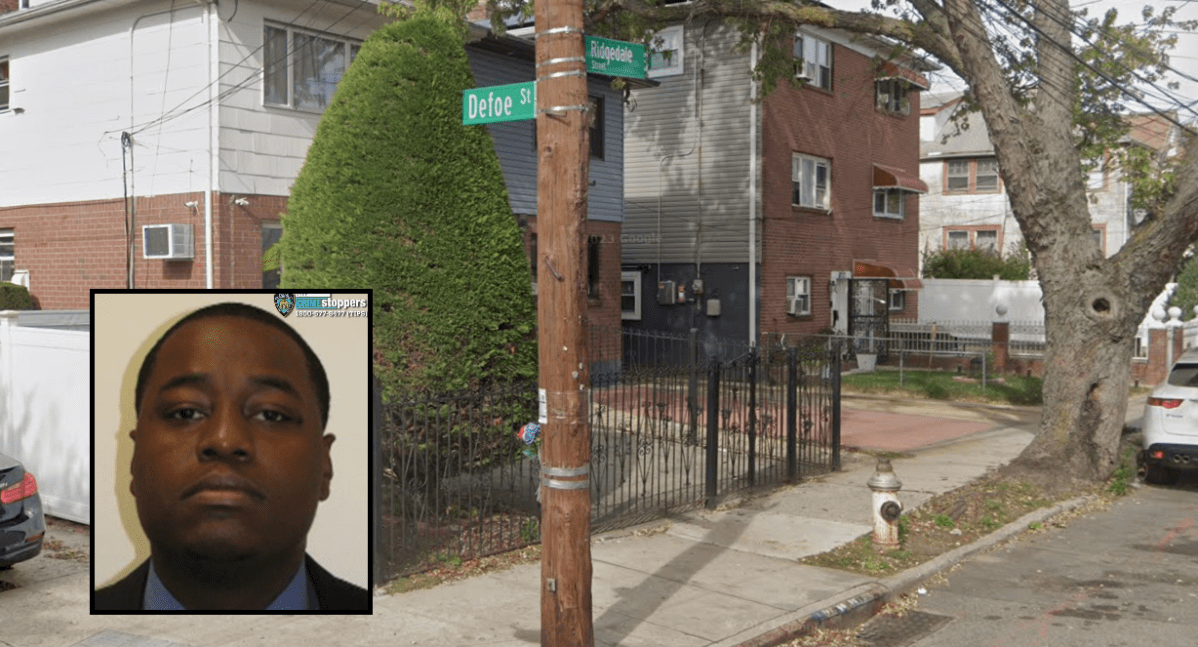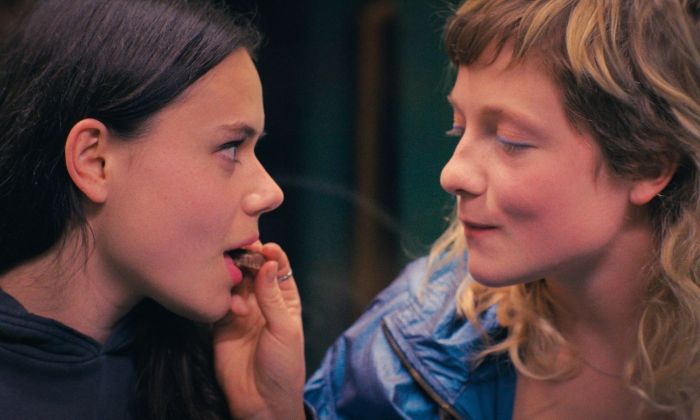By Jerry Tallmer
Stand-up comedy, targeted seriousness contemplate ‘how one survives surviving’
It is a recipe like any other. Well, almost like any other:
5 kilos of…fat are mixed with 10 liters of water and 500 or 1,000 grams of caustic soda. All this is boiled 2 or 3 hours and then cooled. The soap floats to the surface while the water and other sediment remain at the bottom. A bit of salt and soda is added to this mixture. Then fresh water is added and the mixture again boiled 2 or 3 hours. After having cooled, the soap is poured into molds —
You see those three dots in the first line of the above. I’ve omitted one word there. It is the word “human.” So the recipe from the Danzig Anatomic Institute (in the Germany of 1944) actually reads: “5 kilos of human fat are mixed with…” and so on and so on. Human fat by way of stacks of naked (and often decapitated) corpses, male and female, from Auschwitz and other points east and west.
It was a former lab assistant at the Danzig Anatomic Institute whose testimony was put into the records of the Nuremburg Trial on February 19, 1946, morning session, and playwright Jeff Cohen who now shoots it along to us at a crucial point in his careful, step-by-step, searching, pile-driving “The Soap Myth.”
It is a play about the Holocaust and about Holocaust deniers, yes, but it is more than that. “I don’t think it’s a play about did the Nazis make soap,” says the man who wrote it. “I think it’s about how one survives surviving.”
The survivor in “The Soap Myth” is an elderly Jew named Milton Saltzman, who as a boy of 10 or 12 made it through the extermination camps and, returning to his hometown (Sighet, in what is now Romania) witnesses a bizarre funeral procession of mourners following a casket that contains not a dead body, but bars of soap. Mr. Saltzman also has a long-nursed photograph of that procession.
And now, 50 or 60 years later, here in the United States, nobody will listen to him or look at that photo or — as he passionately desires — install a memorial exhibit of bars of soap in the NYC and Washington, D.C. Holocaust museums.
People — including Holocaust scholars — are tired of listening to him. They are tired of having that photograph shoved under their noses. They are tired of being ranted at by him. Screamed at by him. Insulted by him. There are so many more provable things the Nazis did; more certifiable things; worse horrors (“medical” tortures to test and burst the limits of altitude, freezing cold, and oxygen deprivation on human guinea pigs, for instance).
So Milton Saltzman (actor Joel Friedman) has become a kvetch, a nag, a bore. The only person who will still listen to him is a young woman named Annie Blumberg (Katia Asche), who is trying to break in as a freelance writer with a story about Mr. Saltzman for a liberal Jewish magazine.
And he screams at her too. “You’re a nice girl, Annie,” he says — keeps saying — but that isn’t what she wants or he wants. He wants to get some Holocaust museum to mount an exhibit of soap, along with a copy of that photograph; she wants to get the verifiable story.
That’s the point of departure of a play that, through stand-up comedy, targeted seriousness, and several levels in between, explores both ends — no, many contradictory ends — of the truth or falsehood of what latter-day Holocaust deniers (and not just they) have come to dismiss as The Soap Myth.
It introduces us to one such Holocaust denier, a smooth-talking, good looking British historian named Brenda Goodsen (Louisa Flaningam) who pulls the wool over reporter Annie Blumberg’s eyes and only gives vent to deep-seated Jew-hatred when poisonously stirring up the crowd at a rally of American yahoo anti-Semites.
The Brenda Goodsen character, says playwright Cohen, “is an amalgam of half a dozen well-known Holocaust deniers, English, Swiss, American, who are out there. I’ve changed some names because my intent is not to make a documentary but to show as many sides of the issue as I can.”
Milton Saltzman and Annie Blumberg are dramatic fictions, but they are real people too.
“This play has taken a long time to write, over the past eight years,” says the Jeff Cohen whose earlier works include two fascinating updates of Chekhov (“The Seagull: The Hamptons: 1990” and “Uncle Jack”), and whose Tribeca Playhouse was a fortress of survival in the immediate wake of 9/11.
“It all began because I met a man named Morris Spitzer. In early 2002 he was seeing something at the Tribeca Playhouse, and he came up and talked to me afterward. He showed me an article about himself in Moment, the liberal Jewish magazine. What had happened to him is kind of as it is in the play. Here was a person, an eyewitness. After liberation he’d found his way back to his hometown, Sighet, which is also Elie Wiesel’s hometown. He had seen this funeral and had this photo.”
So the Annie Blumberg of this play — who hails from Baltimore, like Jeff Cohen — is really Jeff Cohen himself, digging for eight years for the right way to tell the story. “Frankly, she is me. She gets it wrong, My play gets it right.”
There is one other real name in “The Soap Myth.” It is Stanley Cohen, author of a (non-existent) anti-denial best-seller called “The Holocaust Denied.” Stanley Cohen is the name of Jeff Cohen’s father. Like Morris Spitzer, he has now been taken by death and will never get to see what Jeff Cohen put on paper and, under the direction of Larissa Lury — one of Jeff’s onetime drama students — on stage at the Seaport.
Bottom line: What’s Jeff Cohen’s root feeling about the Soap Myth?
“I believe it is indisputable that at the Danzig Institute they made soap as in the play. I don’t care if they made four bars or 4 million bars. I don’t care. But Holocaust deniers do care, and so do the Holocaust scholars.
“I am suggesting — as Milton Saltzman does in the play — that allowing the enemy to set the rules is not a good idea.”
There are certain movies, plays, books that one wishes would never end. For me, “The Soap Myth” is one of those extraordinary plays.




































